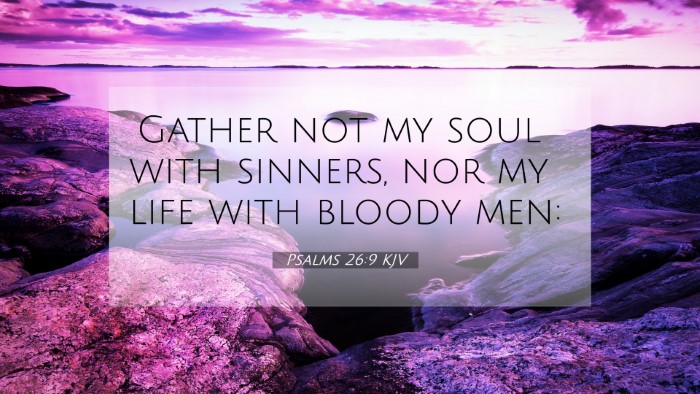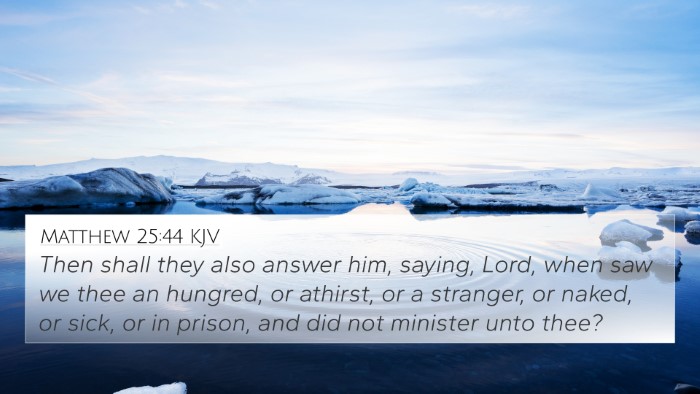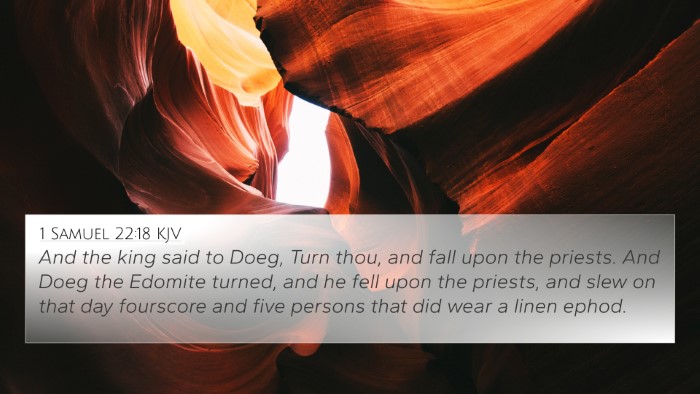Understanding Psalms 26:9
Psalms 26:9 states, "Gather not my soul with sinners, nor my life with bloody men." This verse expresses a deep yearning for divine protection and separation from wicked individuals. To grasp its meaning, we can pull insights from various public domain commentaries.
Context and Significance
This psalm, attributed to David, highlights his desire for righteousness and his plea for divine justice. The emotional weight of the verse is tied to David’s understanding of the consequences of being associated with the sinful and violent. Throughout the Psalms, there’s a recurring theme of longing for purity and separation from wrongdoing.
Commentary Insights
According to Matthew Henry, this verse illustrates David’s awareness of the morally corrupt nature of those he wishes to avoid. His plea to God serves as a request not just for physical distancing but spiritual safeguarding.
Albert Barnes emphasizes the metaphorical implications of "sinners" and "bloody men." To Barnes, these terms represent the antithesis of a devout life; thus, David seeks to ensure his own spirit remains untouched by such evil.
Adam Clarke provides insight into the societal ramifications of being associated with such individuals. He notes that ancient cultures often judged a person's character based on their associations—David’s plea reflects a desire for personal integrity and communal respect.
Cross-References
To deepen our understanding of Psalms 26:9, we can explore related Bible verses that embody similar themes:
- Psalms 1:1 - "Blessed is the man who does not walk in the counsel of the wicked."
- Psalms 55:23 - "But you, O God, will bring down the wicked."
- Psalms 139:19 - "If only you, God, would slay the wicked!"
- Proverbs 1:10 - "My son, if sinful men entice you, do not give in to them."
- Isaiah 1:15 - "When you spread out your hands in prayer, I hide my eyes from you; even when you offer many prayers, I am not listening."
- 2 Corinthians 6:14 - "Do not be unequally yoked together with unbelievers."
- 1 Peter 3:12 - "For the eyes of the Lord are on the righteous and his ears are open to their prayers, but the face of the Lord is against those who do evil."
- Psalms 34:21 - "Evil will slay the wicked, and those who hate the righteous will be condemned."
- Proverbs 3:32 - "For the Lord detests the perverse but takes the upright into his confidence."
- Romans 16:17 - "I urge you, brothers and sisters, to watch out for those who cause divisions and put obstacles in your way that are contrary to the teaching you have learned."
Thematic Connections
The connection between Psalms 26:9 and other verses shows the consistent Biblical theme of divine justice and the importance of fellowship with the righteous. Understanding these connections can deepen our biblical study:
- Cross-Referencing Biblical Texts: Each of the mentioned verses carries a theme of moral discernment.
- Connections Between Bible Verses: By studying these verses together, readers glean a holistic view of the Biblical stance on righteousness versus wickedness.
- Bible Verse Parallels: Psalms 26:9 is paralleled in the themes found throughout both Old and New Testaments, particularly regarding the avoidance of sinful company.
Application and Reflection
The central message of Psalms 26:9 is a call for self-reflection. As we confront our own associations and spiritual affiliations, this verse serves as a reminder to choose companionship and influences that lead one closer to God. It encapsulates the need for believers to be vigilant in their moral choices.
This verse teaches that proximity to the wicked can lead to spiritual corruption, underlining the lessons that can be drawn from biblical cross-references. Engaging in comprehensive Bible cross-reference materials can cultivate a deeper understanding of these themes and help individuals navigate their spiritual journeys.
Tools for Bible Cross-Referencing
Numerous resources are available for those interested in exploring the connections between Bible verses. Tools such as Bible concordances and cross-reference guides facilitate a deeper understanding of scriptural interrelations.
Conclusion
Psalms 26:9 invites believers to examine their spiritual environment. It resonates with overarching biblical principles regarding the nature of good and evil. Through the use of tools designed for Bible cross-referencing and thematic exploration, individuals can enrich their spiritual lives and ensure they are aligning with God's desires for purity and righteousness.
















